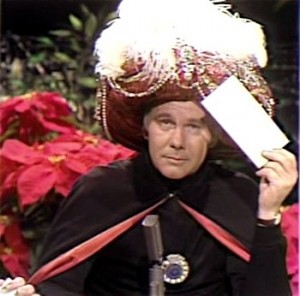Telepathy Journalism
 Kate McMillan is amused at the AP’s fawning reports on President Obama’s non-State of the Union speech and especially by the fact that they were written before said speech was actually given.
Kate McMillan is amused at the AP’s fawning reports on President Obama’s non-State of the Union speech and especially by the fact that they were written before said speech was actually given.
The practice of writing up reports based on prepared remarks is hardly new, of course, but it is rather odd. The general practice is to write up a preview article in future tense (“Obama will say” or “Obama is expected to announce”) and then transform it into a past-tense article once the speech has been delivered but sometimes reporters just skip ahead.
While rather surreal, it’s actually a good thing to have this reporting — so long as it’s later followed by reporting on the actual event.
Most obviously, it gets the information out there faster.
Additionally, it ensures at least one round of coverage of the substance of the remarks rather than the optics of the delivery. As Steven Taylor has argued for years, the lasting impression of a speech is formed from a handful of soundbytes played the next day on radio and television. Since seasoned speechwriters can predict what those will be in advance, they can use them to bury the more mundane parts of the speech. This way, we have the Ron Fourniers of the world — not to mention hundreds of bloggers — actually read the damn thing.
I listened to the speech and its coverage on ABC. I was amused by the need that George S. apparent felt to re-organize the speech and explain it. If it needed explaining, it was a flop.
I didn’t think it was a flop; I just thought it wasn’t particularly interesting. An SOTU-like laundry list, the appropriate noises.
It’s not totally telepathic journalism. In at least the 6-8pm news slot the talking heads were either talking about what he needs to say or should say…then they were reading from released transcripts of the speech from the W.H..
So it’s partial telepathy.
Well, look; If it’s true.. and given the history of the thing I’ve no doubt is IS true… then why are we not assuming that much of the Dinosaur’s comments on Jindal’s performance were not similarly pre-written, and slanted?
Because a large part of the criticism was in how Jindal delivered his speech, something they would have no way of knowing before hand.
If that was, in fact, prepared ahead of time, then the journalists just might be psychic, for calling the unlikely outcome right before it happened.
Or perhaps in both cases, they’re trying to create their own reality? Some folks call it ‘spin’.
True, but when the reality they create matches the reality observed, that’s called being right.
Somehow that doesn’t seem to credit them all that highly.
Yes, I know that you find being right highly overrated.
Isn’t this known as Laphamization?
The problem, of course, with all of this is that occasionally Dewey wins, and Bob Hope reads in the paper that he’s dead.
But those, are easily disproved. Hope, at the time, was still drawing breath. In response he got the issue they know famous and rather hackneyed line about how his demise was exaggerated somewhat. Truman, meanwhile, got to pose with the newspaper falsely announcing his defeat.
Matters of opinion, meanwhile, (you really stunk as a speaker , Obama was really super as a speaker, etc..) are a bit harder to disprove. Thereby, someone three writing such an opinion, is a little harder to call a liar.